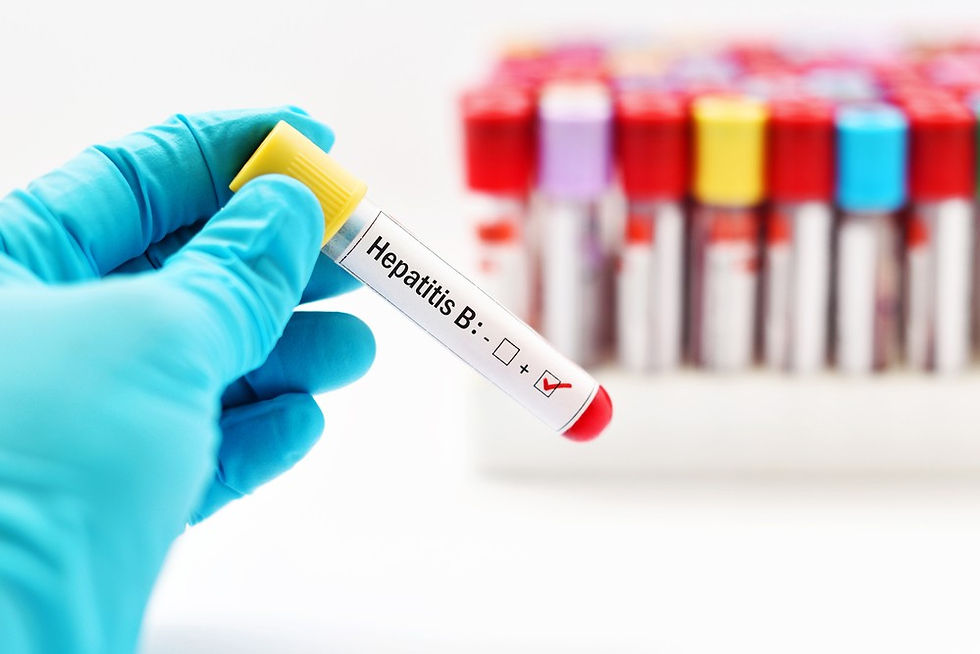


A Viral Marker Test is a blood test used to detect the presence of specific viral infections in the body. These tests help identify viruses like Hepatitis B, Hepatitis C, HIV, and Herpes Simplex Virus (HSV) by detecting viral antigens, antibodies, or genetic material in the blood.
Viral marker tests are essential for diagnosing infections early, monitoring disease progression, and preventing the spread of contagious viruses. These tests are widely recommended for individuals experiencing symptoms such as fever, fatigue, nausea, liver dysfunction, and immune system weakness or those at risk due to unprotected sexual contact, blood transfusions, or exposure to contaminated needles.
At Biocheck Diagnostics And Polyclinic, we offer highly advanced viral marker testing to ensure accurate detection of infections and provide timely treatment solutions. Whether you need routine screening, diagnostic testing, or monitoring for viral diseases, our State-of-the-Art Diagnostics Center ensures reliable and precise results.
Viral Markers Test
A Viral Marker Test is a blood test used to detect the presence of specific viral infections in the body. These tests help identify viruses like Hepatitis B, Hepatitis C, HIV, and Herpes Simplex Virus (HSV) by detecting viral antigens, antibodies, or genetic material in the blood.
Viral marker tests are essential for diagnosing infections early, monitoring disease progression, and preventing the spread of contagious viruses. These tests are widely recommended for individuals experiencing symptoms such as fever, fatigue, nausea, liver dysfunction, and immune system weakness or those at risk due to unprotected sexual contact, blood transfusions, or exposure to contaminated needles.
Viral Markers Test

Preparing for a viral marker test is simple, but following these guidelines ensures accurate results:
Always consult your healthcare provider for specific pre-test instructions based on your symptoms and medical history.
WHY CHOOSE Biocheck Diagnostics And Polyclinic
Our laboratory is led by a highly qualified M.D. Pathologist, ensuring that every test is interpreted with expert knowledge.
We use advanced technology and automated systems to ensure that your Viral Markers results are accurate, reliable, and fast.
Our lab is staffed with highly trained and experienced hematologists and medical technologists who interpret and analyze your results with precision.
We prioritize your privacy. All test results are confidential and shared only with you and your healthcare provider.
At the heart of everything we do is our commitment to the patient.
We understand that healthcare costs can be a concern, which is why we offer affordable pricing for all of our Viral Markers tests.
What Biocheck Offers
A test that detects antibodies indicating immunity against Hepatitis B due to vaccination or past infection.
Identifies recent or ongoing Hepatitis B infection by detecting IgM antibodies against the core antigen.
Detects both IgM and IgG antibodies to determine past or present Hepatitis B infection.
A marker of active Hepatitis B infection, indicating high viral replication and infectivity.
Detects antibodies against the Hepatitis B e-antigen, signaling a reduction in viral replication.
A test that detects antibodies to Hepatitis C virus, indicating past or present infection.
Identifies recent Hepatitis E virus infection through IgM antibodies.
Diagnoses recent or acute Hepatitis A infection by detecting IgM antibodies.
Confirms past Hepatitis A infection or immunity through IgG antibodies.
Detects past exposure to HSV-1 and HSV-2 infections.
Identifies recent or active HSV-1 and HSV-2 infections.
KNOW ABOUT VIRAL MARKERS
Viral marker tests are crucial in diagnosing various infectious diseases that can cause serious health complications if left untreated. These tests primarily detect infections caused by Hepatitis B virus (HBV), Hepatitis C virus (HCV), Human Immunodeficiency Virus (HIV), Herpes Simplex Virus (HSV), and Hepatitis A and E viruses.
Hepatitis B & C: These infections cause inflammation of the liver and can lead to chronic liver disease, cirrhosis, and liver cancer if not diagnosed early. Hepatitis B and C primarily spread through blood-to-blood contact, unprotected sexual intercourse, and from mother to child during childbirth. The infection may remain asymptomatic for years, making testing essential for early detection and management.
HIV/AIDS: Human Immunodeficiency Virus (HIV) attacks the immune system, weakening the body’s ability to fight infections. If left untreated, HIV progresses to Acquired Immunodeficiency Syndrome (AIDS), which severely compromises immune function. HIV is transmitted through bodily fluids, including blood, semen, vaginal fluids, and breast milk. Early testing and treatment can help manage the condition and improve life expectancy.
Herpes Simplex Virus (HSV): HSV-1 and HSV-2 cause oral and genital herpes, characterized by painful blisters and sores. The virus remains dormant in the body and can reactivate under stress or a weakened immune system. Serological testing helps identify past or active infections, assisting in timely medical intervention.
Hepatitis A & E: These viruses primarily spread through contaminated food and water, leading to acute liver infections. Symptoms include jaundice, nausea, abdominal pain, and fever. Unlike Hepatitis B and C, these infections do not cause chronic liver disease but can lead to severe complications in individuals with weakened immune systems.
Viral marker tests enable early diagnosis, prompt treatment, and disease monitoring, preventing severe complications and limiting virus transmission.
Viral marker tests are classified based on the type of infection they detect and whether they identify antigens, antibodies, or viral genetic material.
Antibody Detection Tests: These tests detect antibodies produced by the immune system in response to viral infections. Examples include Anti-Hepatitis C Virus (Anti-HCV), HIV Antibody Test, and Hepatitis B Core Antibody Test. These tests help determine past or present infections.
Antigen Detection Tests: These tests identify viral proteins present in the blood, signaling an active infection. Examples include Hepatitis B Surface Antigen (HBsAg) Test and Dengue NS1 Antigen Test.
Viral RNA/DNA Detection (PCR Tests): Polymerase Chain Reaction (PCR) tests detect viral genetic material, offering highly sensitive and early detection of infections like HIV, Hepatitis C, and COVID-19.
Comprehensive Viral Screening Panels: Some tests screen for multiple viral markers simultaneously, such as the Viral Fever Panel or Hepatitis Screening Panel, to identify different viral infections affecting the body.
These tests play a crucial role in diagnosing viral infections early, determining disease severity, and monitoring treatment response.
MAKE APPOINTMENTS